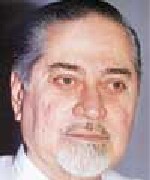 | « Back to article | Print this article |
He was known for his trademark, spotless white and well starched kurta-pyjama, which he would wear every day to, both, his office or any formal occasion. And, was as much at ease speaking immaculate Bengali, the language he had learnt because he was born and brought up in Kolkata, as much as talking about his love for mountaineering and long treks in Bhutan, where the king was a trekking companion.
And, was as much at ease speaking immaculate Bengali, the language he had learnt because he was born and brought up in Kolkata, as much as talking about his love for mountaineering and long treks in Bhutan, where the king was a trekking companion.
Ashok Chand Burman, the 82-year-old patriarch of the family and chairman of fast moving consumer goods (FMCG) major Dabur Ltd, died on Saturday while on vacation in London, He was instrumental in fundamentally transforming a mid-rung ayurveda company firm into a FMCG major.
His great-grandfather, S K Burman, migrated from Punjab to Kolkata and began this family-run business.
The family, under AC's helm, shifted to Delhi in the 1970s due to social and political turmoil in Bengal, starting virtually from a rented shed in Faridabad.
It was a tough struggle up and got tougher in the 1990s in that segment, fighting multinationals with huge cash reserves.
Many gave in and were taken over; Burman asserted he would not sell. Yet, the patriarch realised the family-run, closely-held equity structure, with a staid marketing and branding style, would have to change dramatically to face the MNC onslaught.
First, he took the company public, in 1994, making family members answerable to shareholders. The initial share offer was subscribed 28 times, bringing some cash to play around.
Then, despite resistance within, he hired US consultant McKinsey for a blueprint. Insiders say McKinsey charged Rs 10 crore (Rs 100 million) and many said for a company with Rs 40 crore (Rs 400 million)